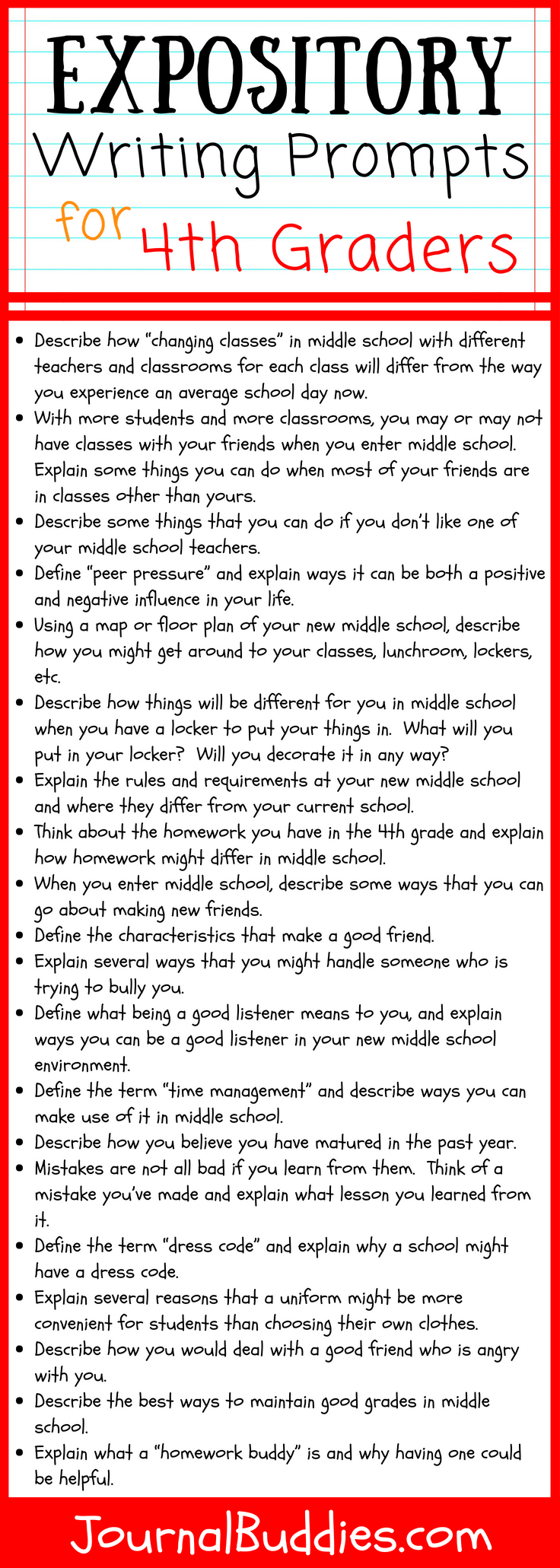The ability to provide information in different contexts is essential to effective communication. Students must practice expository writing throughout their academic careers. The sooner they start, the better. Below are some descriptive, sequential, compare and contrast, cause and effect, and problem/solution writing prompts to help you give your students the practice they need.
6th Grade Expository Writing Rubric
Expository writing compares and contrasts, investigates causes and effects, and poses solutions to problems. It also describes the who, what, where, when, and why of an event. Write an extended definition essay on one of your vocabulary words. Find an interesting story in your local newspaper and describe it in your own words. An expository essay is a genre of writing that explores several aspects of a particular topic to provide information. For a perfect expository essay, the topic should be discussed in an objective manner. The writer should not try to convince the reader about any side of the issue. The following are some other ways of writing expository essays. Expository Writing Grade Level: Sixth Grade Written by: Cyndie Stanley and Rebecca Welch, Jefferson Academy, Broomfield, CO Length of Unit: 5 lessons. The focus of this sixth grade unit is expository writing while integrating content from the sixth grade Core Knowledge literature, history, and science sequence.
Descriptive
- Write an essay describing your school to a potentially new student.
- Write an essay describing the appeal of reality TV shows.
- Write an essay describing a rainy night.
- Write an essay describing your first pet.
- Write an essay describing your first memory.
- It’s Christmas morning and there is a package under the tree containing exactly what you requested. Describe the contents of your package..
- Write an essay describing how you feel when you wake up and discover snow on the ground outside — and school has been cancelled.
Sequential
6th Grade Expository Writing Ideas

- Writing an essay explaining the process you use to style your hair in the morning.
- You have invited your two best friends to spend the afternoon at your home. Write an essay telling how your prepare for their visit.
- Everyone has lost something at one time or another. Write an essay telling what you did to find what you had lost.
- Describe how to make a peanut butter and jelly sandwich.
- Tell how you wash your hair.
- Describe the plot of your favorite book.
Compare and Contrast
- Write an essay comparing and contrasting ownership of cats and dogs.
- Compare and contrast this year in school to last year.
- Compare and contrast your two favorite characters.
- Compare and contrast your family’s home and the home of your dreams.
- Compare and contrast a typical day in your life today and what you think a typical day in your life will be like when you are 25.
- Compare and contrast your two favorite teachers.
Session 6: Envisioning Structures to Plan an Information Book Session 7: Constructing Texts with Solid Bricks of Information: Session 8: Research- Gathering Specific Information Session 9: Writing With Detail Session 11: Using Text Features to Strengthen Writing Session 12: Planning & Crafting Introductions Session 13: Quoting With a Purpose in.
Cause and Effect
- Write an essay telling how peer pressure has affected you this year.
- Write an essay explaining what causes students to drop out of high school.
- Discuss the causes and effects of bullying in schools.
- Discuss the causes and effects of poverty in rural (urban) areas.
- Discuss the causes and effects of drug or alcohol use on families.
Problem/Solution
- Most students do not read or watch news, resulting in a lack of knowledge about the world outside of their immediate neighborhood. Write an essay describing why this is a problem and telling how this problem might be solved.
- Think about the community in which you live. What could you do to make it a better place? Choose one problem that needs to be solved to make your community a better place to live. Write a letter to the editor describing how solving this problem would make your community a better place, and tell what you would do. Give reasons why you think your plan would work.
- Think about what you could do to make your school more beautiful. Think about how you would do this. How could you persuade the people in your school that your idea is a good one? Write a letter to the principal of your school asking for support for your plan for making your school more beautiful. Tell what you would do and how you would do it. Explain why you think your plan is important and why it would work.
- Think about animal abuse. Some people abuse animals by being intentionally cruel to them or neglecting their basic needs; others abuse animals out of ignorance. Think about what could be done to prevent both kinds of animal abuse. Write a letter to leaders in your community describing how you would solve this problem, and how treating animals better would improve the lives of animals and people. Explain why you think your plan will work.
